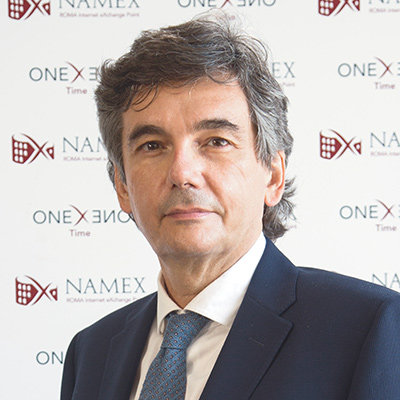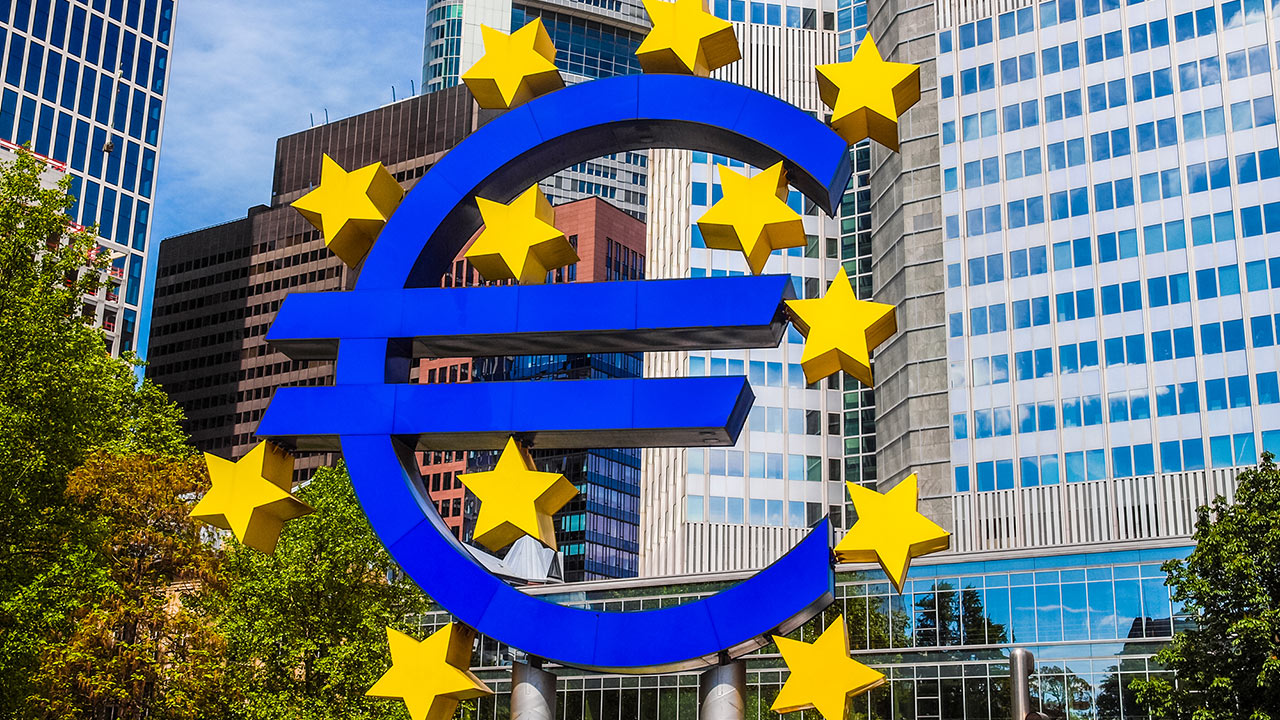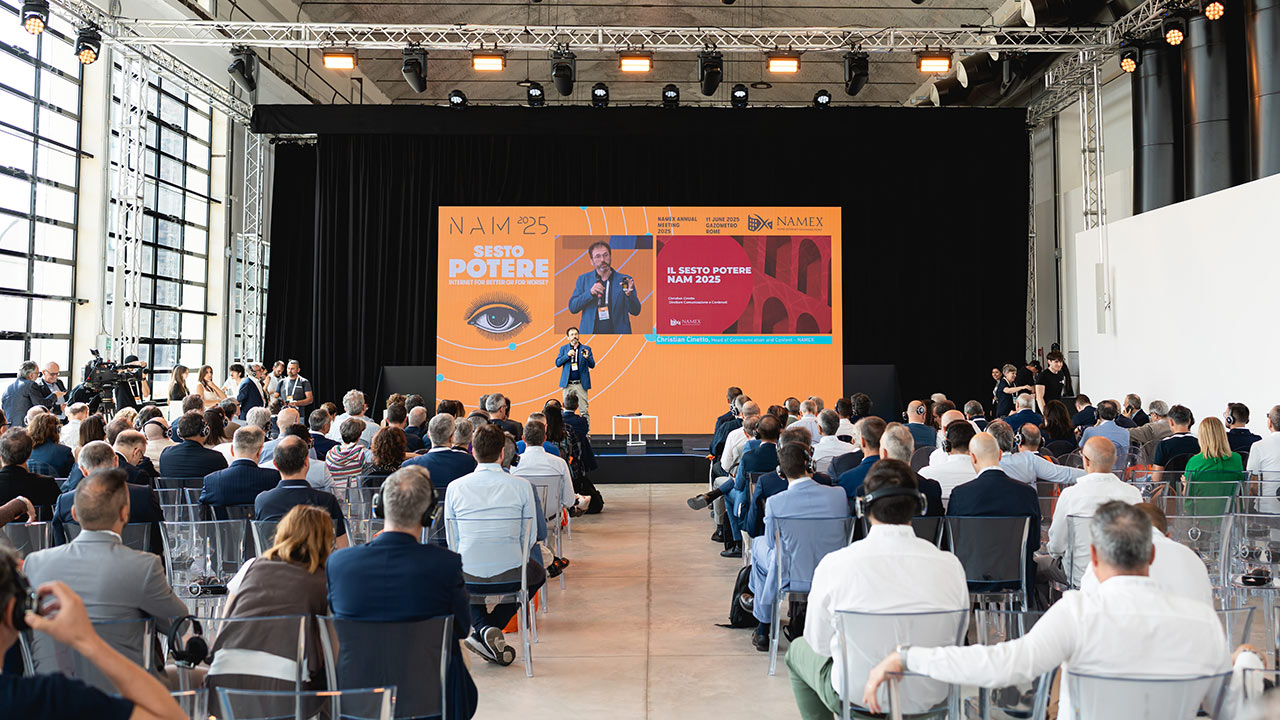
NAMEX NEWSLETTER | JULY 2025

CONSORTIUM
Our Mediterranean: communities, connections, future

— By Maurizio Goretti, Namex CEO
Summer is an opportunity to look around and reflect on the past year. For those who work at Namex, it’s the right time to consider how the infrastructure we help build every day is, first and foremost, a story of people, relationships and communities.
It all began thirty years ago, in 1995, with the birth of NapRoma, a Network Access Point launched within CASPUR, a university consortium in Rome. Only four interconnected ISPs, and no one could have imagined that this embryonic core would eventually become the main internet exchange point of central and southern Italy.
Today, Namex is a neutral, independent, a non-profit organization that brings together 195 ISPs from the consortium and 267 interconnected networks, including content providers, international operators, institutions, research organizations and national and local providers. It’s a technical community, but also a human one, that has made collaboration its method and connection its value.
Our annual event, NAM 2025, brought over 700 people from 270 companies to Rome’s Gazometro, demonstrating a vibrant, engaged, and conscious community. The same spirit drives informal gatherings like the monthly beers in Rome (RMNOG) and the bimonthly ones in Bari (BariNOG): moments when technology meets mutual trust, and from which ideas, projects, and shared solutions often emerge.

NAMEX OBSERVATORY
The white smoke is also felt on the Internet: traffic peaks on Namex
— By Flavio Luciani, Namex CTO
At 6:07 pm on Thursday, May 8, 2025, the world witnessed the long-awaited white smoke rising from the Vatican. A symbolic and highly media-driven event, it once again had an immediate effect on digital infrastructure. In particular, we recorded a significant spike in traffic precisely at the time of the announcement, as shown in the graph below.
The sudden surge coincides with the moment the news broke across news platforms, social media, and streaming services. Notably, the event was also broadcast on RaiPlay and distributed through Namex by the CDNs that handle RaiPlay’s content delivery.

REGULATORY POLICIES
The state of play on fair share
— By Innocenzo Genna, Legal specialist in EU digital policy, competition and liberalization regulations
1. The state of the debate in Europe
The European debate on fair share finds itself in a dormant phase. After the considerable momentum driven by European Commissioner Thierry Breton between 2022 and 2023, prospects for possible legislative proposals suffered a sharp setback in October 2023, when European governments, meeting at the Telecom Council in Léon, expressed a predominantly opposing view. From that moment, the idea of European fair share regulation entered a regressive phase: whilst still referenced in some important official documents, particularly in the European Commission’s White Paper on connectivity and the Draghi Report on competitiveness, the fair share theme appeared more as an echo of supporting stakeholders’ wishes than as a convinced institutional direction.

NAMEX ANNUAL MEETING 2025
NAM2025: "Sesto Potere, Internet for better or worse"
— By Christian Cinetto, Head of Communication and Content
11 June: in Rome we discussed the future of INTERNET(and NAMEX’s role)
Namex grows in traffic peaks, in the number of consortium members and affiliates, but also in face-to-face events. On 11 June we returned to the Gazometro, in Rome, for the Namex Annual Meeting, the appointment that since 2004 has brought together the interconnection community. We reached 700 participants from over 270 companies and recorded more than 250 one-to-one meetings.

COMMUNITY STORIES
The history of AMT
— By the Namex Editorial Staff
oday marks the start of a new series: COMMUNITY STORIES.
We’re giving space to the stories of those who, every day, build a piece, large or small, of Italy’s Internet network. The word ISP hides a world of nuance, made up of people, evolutions, and anecdotes.
We begin from Puglia, from Bari, where this and other stories were born over beers at BARINOG. We interviewed Aldo Altobello, president of Amt Services and one of the pioneers of commercial Internet in southern Italy.

ARTIFICIAL INTELLIGENCE
AI and ETHICS shouldn't even be in the same sentence.
Interview with Maurizio Ferraris - professor of theoretical philosophy at the Faculty of Letters and Philosophy at the University of Turin
(By di Alessandro Longo)
Don’t talk to him about “artificial intelligence ethics”. Meaningless words. A smokescreen for political and social choices we still fail to properly address. “Let’s worry instead about a future where there’ll be no work for anyone, or almost anyone, because everything will be handled by artificial intelligence”. Maurizio Ferraris, one of Italy’s leading digital thinkers, professor of theoretical philosophy at the Faculty of Letters and Philosophy at the University of Turin, has long had an answer to this too. A proposal: “webfare”, as written in his books. Redistribute the wealth we produce as consumers that now stays entirely in the belly of big tech, which are preparing to become even more powerful by dominating the artificial intelligence era.
He clarifies this in our interview.
What’s the point of artificial intelligence ethics?
We must start from the fact that artificial intelligence as such, as algorithms governing data, has no ethics, having no will (will comes from those who programme the algorithms). Therefore, claiming to insert ethics into algorithms isn’t very different from wanting to teach the ten commandments to an alarm clock or a toaster. Instructions are certainly given, but no conscience is formed – simply a human conscience tries to mitigate the risks associated with machine operation, rather like when it was decided to make the symbol on Mercedes-Benz bonnets bendable, to reduce impact in case of accident.
News
NEWS from NAMEX and surroundings
For those who missed it or want to revisit what happened at the Gazometro on 11 June at NAM2025, you’ll find photos and information on the dedicated website and videos on our YouTube channel, which includes the plenary and workshop sessions plus exclusive interviews with all speakers.
» From Rome to the Mediterranean: vision becoming reality.
Thirty years ago, Namex’s pioneers, whom we celebrated on 15 April, began a project many considered visionary: making Rome a digital hub. Our General Director Maurizio Goretti discussed this with Federica Meta, CorCom director.
Read more
» Data centers are increasingly seen as opportunities for investment and growth in the country.
In this article, Mila Fiordalisi analyses a “dark side” – the risk of speculation or poorly considered investments. Maurizio Goretti contributes a warning: “Without adequate fibre connections and electrical substations, we risk proliferating empty boxes that harm the sector.”
Read more
» On 15 May, Marta Burocchi, Namex network engineer, made her international debut at the RIPE90 meeting, presenting the innovative digital twin environment to the global community. The solution, based on Kathará technology, functions as a “flight simulator” for the peering platform, allowing Namex members to safely test configurations before production deployment. Here’s her complete presentation.
Read more
» On 15 May, shortly after 6pm, Namex traffic recorded an extraordinary +40% peak above average, coinciding exactly with the white smoke announcing the election of the new Pope.
Read more
» On 16 April, Namex registered a new absolute traffic record with a peak of 1,354 Tbps during the Champions League match between Inter and Bayern Munich. This represents a 35% increase from just 90 days earlier, confirming exponential growth in Internet traffic linked to major live sporting events.
Read more
» At the first National Cloud Conference – held in Rome on 14 May – a strong demand emerged to create an Italian cloud supply chain, independent from foreign big tech. Promoters, including Consorzio Italia Cloud (the conference organiser), are calling for secure, sovereign infrastructure for managing public and strategic data. Concerns focus on current dependence on foreign providers, which could undermine the country’s digital security and autonomy. The appeal targets government support for a national ecosystem of shared technologies, skills and regulations. The goal is building infrastructure that protects public administration data whilst fostering Italian innovation. Maurizio Goretti was one of the conference speakers.
Read more
» Starlink’s record outage in July: what happened and its implications
On 24 July 2025, SpaceX’s Starlink satellite service suffered its most severe and prolonged global blackout since launch, leaving over 60,000 users worldwide without connection for about two and a half hours.
According to official company statements, the blackout was caused by an “internal software services failure” managing Starlink’s core network. Specifically, a network upgrade introduced a critical misconfiguration, triggering a cascading error that blocked communication between satellites and between satellites and ground infrastructure.
Thousands of private users and businesses across Europe, North America, Asia and Australia, many exclusively dependent on Starlink, found themselves without connectivity. Disruptions were also reported in critical sectors including mining, maritime and emergency operations in remote areas. One of the most significant impacts occurred in Ukraine, where Starlink provides connectivity for armed forces and operate drones and real-time surveillance systems. The blackout caused suspension of drone missions and loss of live feeds, temporarily jeopardising battlefield coordination. Additionally, various public utilities and emergency response services in rural areas found themselves momentarily isolated.
Beyond these practical consequences, the event highlighted how governments and armed forces increasingly rely on satellite infrastructure managed by private companies, risking national vulnerability and loss of digital sovereignty. The episode has reignited international debate about the need for resilient, multi-platform communications networks, especially for critical and mission-critical applications. The issue was already on governments’ radar, with many investing in national satellite networks. In July, the Meloni government allocated €767 million to create a national satellite network dedicated to institutional communications, having previously been in negotiations with Starlink for the same purpose.
Read more
» Copper lines decline whilst fibre and data traffic grow: Agcom’s 2024 data
Fibre now covers 70.7% of the population (as of 31 December 2024), up from 59% in 2023, according to Agcom’s annual report presented in July. However, the Authority highlights persistent strong territorial disparities in both coverage and ultra-broadband subscriptions.
Ultra-broadband lines grew both annually (+812,000) and quarterly (+233,000), reaching 17.43 million lines. Connections of 100 Mbps or higher rose from 52.6% in 2020 to 79.3% in 2024, whilst connections ≥1 Gbps increased from 8.7% to 28.4%.
Data traffic is also rising: each fixed line consumes an average of 9.48 GB daily (+13.8% compared to 2023). Mobile remains the primary Internet access channel for many users, but demand for fast fixed networks is growing, driven by streaming, smart working and cloud services.
Agcom’s report also confirms an 8.7% increase in telecommunications infrastructure investment, bringing total spending to €7.05 billion, with sector revenues accounting for 1.3% of GDP and 1.9% growth in household spending.
Agcom confirms the continued decline of copper connections (-700,000 annually) and FTTH fibre expansion, which gained 1.23 million lines in 2024.
Agcom President Pasquale Lasorella also highlighted profound transformations introduced in Italy’s telecom market by recent M&A operations, investments and TIM’s network spin-off, prompting the regulator to undertake new analysis.
TIM’s fixed network structural separation with transfer to Fibercop, Swisscom’s acquisition of Vodafone Italia, and Poste Italiane becoming TIM’s largest shareholder have “radically altered the market structure, particularly wholesale”, Lasorella stated, leading Agcom to begin fresh fixed network access market analysis to determine whether Fibercop qualifies as a wholesale-only operator and establish consequent regulatory framework.
Read more
» The UK has made age recognition mandatory on all sites hosting pornographic content and other materials considered risky for minors. These sites must implement “robust and reliable” age verification systems (such as selfie recognition, identity documents or credit cards) to prevent access by under-18s. The regulation, part of the Online Safety Act, covers not only pornographic sites but also platforms potentially showing self-harm, eating disorder or dangerous behaviour content; non-compliance risks fines up to £18 million or 10% of global turnover. This makes access to adult sites by British minors among the most restricted in OECD countries. Platforms like Reddit, Discord, Grindr, Bluesky and X have also activated various age-gating forms for certain functions or content. Critics highlight privacy and security risks from mandating sensitive data provision to private entities and probable increased VPN usage to bypass controls.
Meanwhile, the European Union is piloting this functionality: France, Italy, Spain, Greece and Denmark are the first five member states testing an age verification app developed by the European Commission. The trial aims to create privacy-preserving age verification: when activated, the app allows proof of majority without providing personal data to sites, with separate processes between certificate issuers and verifiers. This pilot model – intended for integration into the future European Digital Identity Wallet (expected 2026) – is destined to become the European standard.
The situation in France is already very tense: communications authority Arcom has mandated age verification for pornographic sites. Companies like Aylo (owner of Pornhub, Redtube, YouPorn) have temporarily blocked their sites in the country in protest, arguing the current regulatory framework is ineffective, fragmented and endangers privacy, whilst highlighting the lack of a truly uniform “pan-European” solution. French courts have repeatedly suspended and reactivated the obligation, creating further uncertainty.
Read more
» The Digital Networks Act advances: a revolution loved and hated by many
The Digital Networks Act (DNA), an advanced-stage European regulation aiming to revolutionise EU telecommunications, is making progress toward building a genuine digital networks single market. The legislation seeks to eliminate regulatory fragmentation between countries, strengthen infrastructure security (including 5G, future generations and submarine cables), accelerate optical fibre transition and harmonise rules on tariffs and radio spectrum. More centralised governance through EU bodies like BEREC and a new European entity is also envisaged.
Debate is heated both politically and among operators. A public consultation closed on 11 July, with the final text expected by end-2025. The DNA is seen as both a historic breakthrough and a systemic threat to Europe’s digital ecosystem; its approval could radically reshape telecommunications infrastructure, competition and Internet governance in the Union.
Supporters: Major telecommunications operators and industry associations argue the DNA is necessary to make Europe globally competitive, improve security, streamline bureaucracy and incentivise advanced digital infrastructure investment. They stress that only by uniting markets and rules can Europe compete with US and Asian Big Tech dominance, accelerating fibre and 5G adoption whilst reducing fragmentation that currently hinders innovation.
Opponents: Strong criticism comes from independent Internet provider associations, small local operators, consumer and digital rights associations, and some national regulators. They fear the DNA could threaten net neutrality and pluralism, favouring European oligopoly formation controlled by few large giants at thousands of local businesses’ expense, with negative impacts on competition, prices and pluralism. They also contest choosing binding unified regulation that ignores geographical, economic and technological differences between states, highlighting risks of increased consumer costs, reduced service quality, and criticism of regulatory acceleration to modify rules just implemented.
Read more
» Retelit: a submarine cable between Taranto and Greece
Retelit, a B2B telecommunications operator in Italy, presented feasibility study results for the “MAGNA GRECIA CABLE” project in Taranto – submarine infrastructure connecting Italy and Greece through a resilient, secure Ionian Sea route. The approximately 323.5km cable aims to strengthen Italy’s position as Mediterranean digital hub, promoting territorial, business and urban digital transformation.
Taranto was chosen as Italy’s landing point due to its strategic position and Ministry of Enterprise and Made in Italy support. On the Greek side, the site will be Plataria, near Igoumenitsa, already equipped with existing landing infrastructure.
The study, co-financed by the EU CEF-Digital programme, assessed environmental, technological and authorisation aspects, forecasting minimal impact and integration with existing digital and energy infrastructure. The project requires initial investment of at least €30 million.
Read more
» Russia abandons WhatsApp, switches to “autarkic” chat: following the Chinese model
On 24 June, Russian President Vladimir Putin signed legislation authorising creation of a state messaging app called “Max”. The dual objective: integrate it into digital public services whilst progressively reducing use of foreign platforms like WhatsApp and Telegram, considered potentially dangerous to national security. This project forms part of a broader digital autarky strategy – building an internal technological ecosystem directly state-controlled and independent from foreign companies, similar to China’s national app model.
The new app will function not only for messaging or video calling, but also for public service authentication, payments and official document consultation. It will be automatically installed on all new devices sold in Russia from 1 September.
The decision fits an increasingly repressive context: in recent years Russia has intensified online activity control, criminalising posts and likes deemed “extremist”, banning VPN use and systematically slowing or blocking access to foreign services.
Read more

